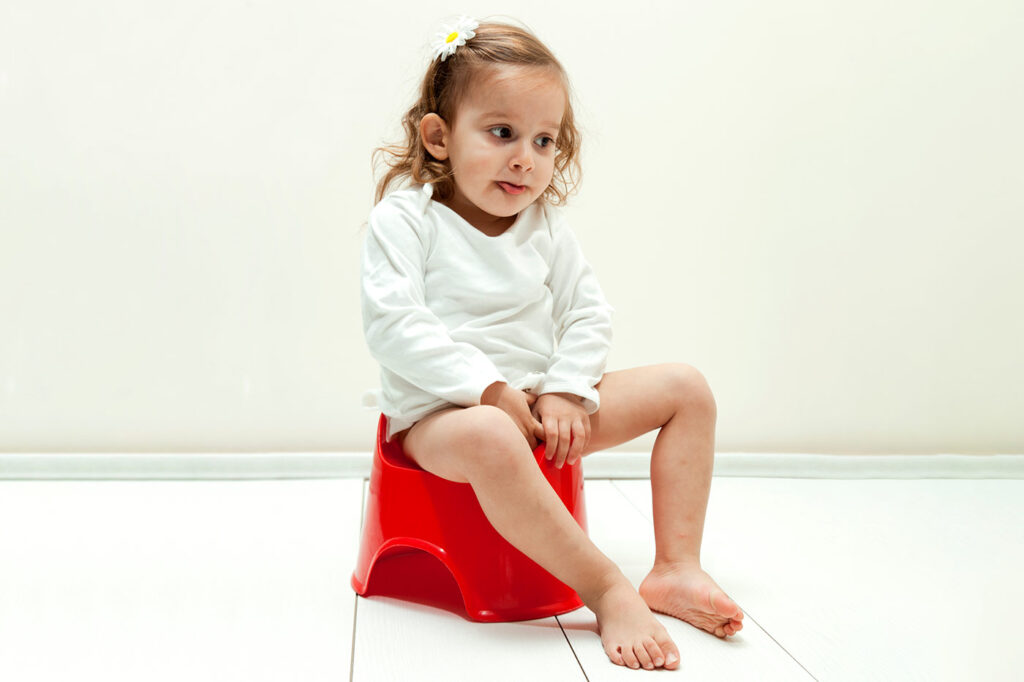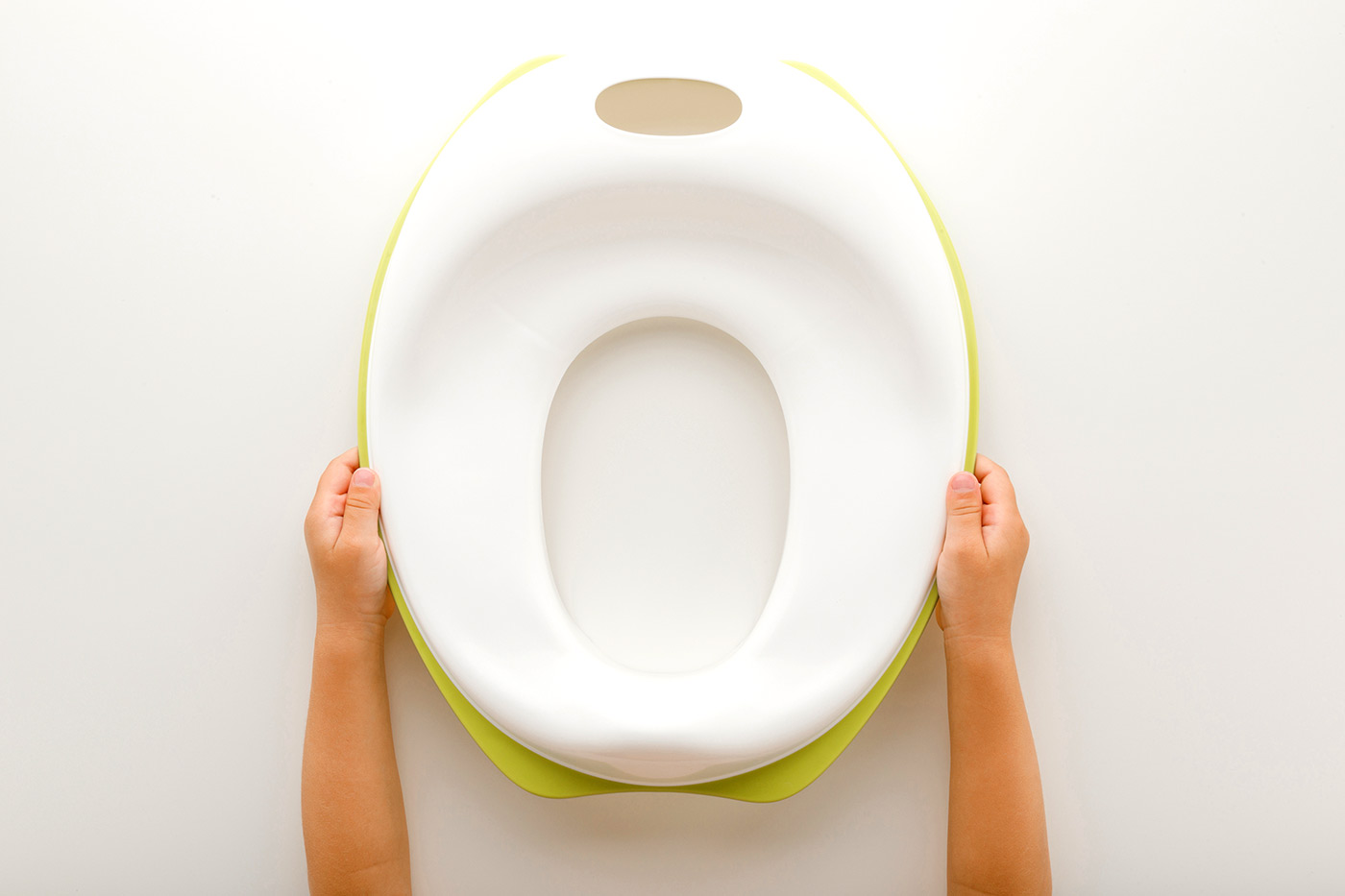When Your 3 ½ Year Old Is Not Potty Trained
Is your 3 1/2 year old not potty trained yet? It’s not too late! Get potty training tips for kids who refuse to give up diapers.

If you struggle with potty training, you likely feel a range of emotions.
Perhaps you’re embarrassed that your 3 ½ year old is still not potty trained even when her classmates at preschool are. You’re frustrated that she doesn’t care about accidents, and confused that incentives like stickers and candy aren’t working.
Don’t worry, friend. You’re not the only parent who has wondered whether it’s normal for her child to still use pull-ups at this age. What can you do when your 3 year old won’t potty train? Let’s take a look at a few do’s and don’ts specifically for kids this age:
Table of Contents
1. Do use incentives, not typical rewards
Potty training is practically synonymous with typical rewards and treats like candy, stickers, and toys. They work well initially, but after a while, the “wow factor” fades. And if kids are only using the potty to get a reward, they just might stop doing so when they start getting bored of it.
You’re then left with either upping the ante and giving better rewards, or a 3 year old who won’t poop on the potty because the rewards just aren’t cutting it anymore.
That’s why I’m not a fan of typical, “external” rewards that are unsustainable and fizzle quickly. Instead, offer incentives, especially the ones you can continue long past potty training.
For instance, is there a time of the day that your child enjoys the most, like going to the park in the afternoon or watching television in the evening? Build using the potty into your routine by making it a “precursor” to that activity. After she uses the potty, she gets to go to the park or watch her show.
Another example is encouraging the feeling of a job well done. “Reward” her with praise, highlight her accomplishments, and describe what she has done. Give a high five and say, “You did it!” after she peed in the potty.
And remember, it’s not just about peeing or pooping in the potty that deserves attention. Recognize the times she made progress or improved. You could say, “It’s okay if nothing came out. You still sat on the potty for a full 10 minutes!”
Free email course: Want to potty train without the power struggles? Sign up for the free 5-day email course, Peaceful Potty Training! No more putting unrealistic deadlines or using rewards that fizzle. Join the email course below. You’ll also get my newsletters, which parents say they LOVE:
“Seeing this email makes me feel much better. Thank you for the way you inspire people and especially moms out here.” -Maureen W.
2. Don’t use diapers or pull-ups
Many of us hang onto diapers as a way to end power struggles (“Okay fine, just this once!”). Or we’re scared that our kids aren’t ready to ditch them completely (“My 3 year old will wet his pants during the day!”)
But at this stage, diapers and pull-ups are likely a crutch that your child relies on.
Using the potty consistently doesn’t seem as urgent when he knows he has a backup in place. Imagine trying to lose weight, but knowing that you have cookies in the cupboard and ice cream in the freezer.
The same is true with diapers. On one hand, you say that he should use the potty, yet he still has regular access to diapers.
Instead, ditch diapers completely and have him wear undies. Of course, the biggest downside is the ensuing mess you’ll have to clean up. However, with consistency, the short-term pain can eventually lead to long-term gain.
Do what you can to make the initial use of undies less stressful. For instance, take him to the bathroom before you leave the house and make sure you have plenty of laundry detergent and spare underwear. He’ll have no choice but to use the potty or deal with the constant accidents.
3. Do use “good” peer pressure
Nothing is worse for any parent than comparing yourself or your kids to others, especially with potty training. Your friend’s toddler has been potty trained since 18 months, or your mother-in-law keeps asking why your child is still wearing pull-ups.
That’s not the kind of pressure you want to succumb to. But guess what: you can use peer pressure to your advantage.
Now, we’re not talking about letting all these comments and comparisons get to your head. Instead, see if you can surround your child with other kids who are already using the potty.
For instance, your child might have a cousin slightly older than her who uses the bathroom now. Encourage them to play together so that she can see someone that she potentially looks up to and wants to mimic.
Or you could enroll her in preschool, even if for a few hours, and let the teachers know that you want her to feel like potty training is normal and common. You can also read potty training books so that she feels like other kids are going through the same experiences.
She might not take to potty training if she only hears about it from you. But when she sees other kids using the potty regularly, she might be more willing to give it a try.
4. Don’t use the potty as punishment
Have you been so frustrated with your child’s accidents that you’ve resorted to using the potty as punishment?
Perhaps it was the time she left a gooey mess on her undies or peed all over the floor minutes after she said she didn’t have to go. So, to drive the lesson home, you told her to sit on the potty so that she learns that that’s where she’s supposed to do her business.
As frustrating as accidents are, don’t tie the potty with punishment, like making her sit on the potty whenever she has an accident. At first, it might seem like doing so sends the message that this is where she should relieve herself. But instead, this turns the potty into a negative association.
Instead, keep the potty positive, not a source of frustration or punishment.
A better alternative is to use natural consequences to teach a lesson. After an accident, have her help you clean the mess, flush her poop in the toilet, or grab a fresh pair of undies. Let her experience the real-life consequences of her accidents, which can serve as motivation to use the potty.
5. Do take your child to the potty frequently
Include frequent trips to the potty throughout the day. Sitting on the potty often can make it a part of your daily routine. The more consistently your child sits on the potty, the more likely he’ll accept it as the norm (instead of fighting you about it).
Potty use can turn into such a habit that he might not even need reminders from you any longer. Soon, he’ll take the initiative and go on his own, simply because he has come to expect it and will do so automatically.
Frequent trips to the potty increase the chance that something will come out. The more he sits, the more likely he’ll actually go. And if he has, say, anxiety about pooping during potty training, the familiarity and consistency can ease these difficult feelings.
To help him want and need to use the potty, offer plenty of liquids throughout the day. He’s more likely to experience the urge to go when his bladder is full than when it’s empty.
And remember, it’s okay if he doesn’t pee or poop every time he sits. Considering how often he’ll sit, it’s unlikely he’ll squeeze something out every time. The goal is to help him feel comfortable with using the potty and develop a habit—anything more is a bonus.

6. Don’t make a big deal
I don’t know about you, but I tend to make things worse by harping on an issue over and over. But the minute I stop making it a “thing” to argue about, that’s when my kids finally warm up to the idea.
So, rest assured, friend: your child won’t rely on diapers forever. Kids will come around to potty training on their own. Sometimes, that’s simply when they’re ready, both physically and mentally. But other times, they’ll finally take to the potty when we stop making a big deal out of it.
If you find yourself beyond frustrated with potty training, take a step back and don’t make a big deal about it. Treat accidents as inevitable and normal, not the end of the world. Don’t fight your child about using the potty—instead, show empathy and even ask yourself if it’s a good time to stop potty training and wait for a bit.
Let go of the comparison trap as well. Potty training—even late potty training—has nothing to do with a child’s intelligence or success in life. There’s nothing wrong with your child if he has accidents or refuses to sit on the potty.
The more you try to force the issue, the worse potty training can get. Turn things around by realizing that, in hindsight, this is a temporary scenario not worth stressing about.

Frequently asked questions
The one exception to ditching diapers and pull-ups is at night, so yes, you can. our pediatrician told us that you can’t potty train for sleep, especially at night. So, even though you’re ditching diapers during the day, you can still use diapers when your child sleeps.
Your child is likely ready to wear undies for sleep when he can go five straight nights with a dry diaper.
The frequency is totally up to you! You might prefer going by the clock and taking her to the bathroom every two hours. Perhaps you’ll go with each transition to your day, like before a nap or after eating a snack. Or you could simply keep an eye out for signs that she’s about to pee or poop, like if she hides in a corner or does a pee-pee dance.
One option is to try potty training in three days, though that would still require either taking a Friday or Monday off or waiting for a three-day weekend.
And since he does well at school, I would ask the teachers for tips on what they do to make it successful, as well as what they recommend that you do at home. Maybe if you’re consistent with what they do, he can better tie the two together and have just as much success at home, too.
The bottom line
It’s easy to worry that something is wrong when your 3 ½ year old isn’t potty trained. But let me leave you with a parting word: yet. She’s not potty trained… yet. But she will be, and hopefully, with the potty training tips you learned, the journey to get there will be a smooth one.
Get more tips:
- How Many Potty Training Accidents Are Normal?
- 6 Signs Your Child Is Not Ready for Potty Training
- How to Potty Train Gradually
Don’t forget: Join my newsletter and sign up for the free 5-day email course, Peaceful Potty Training below:

